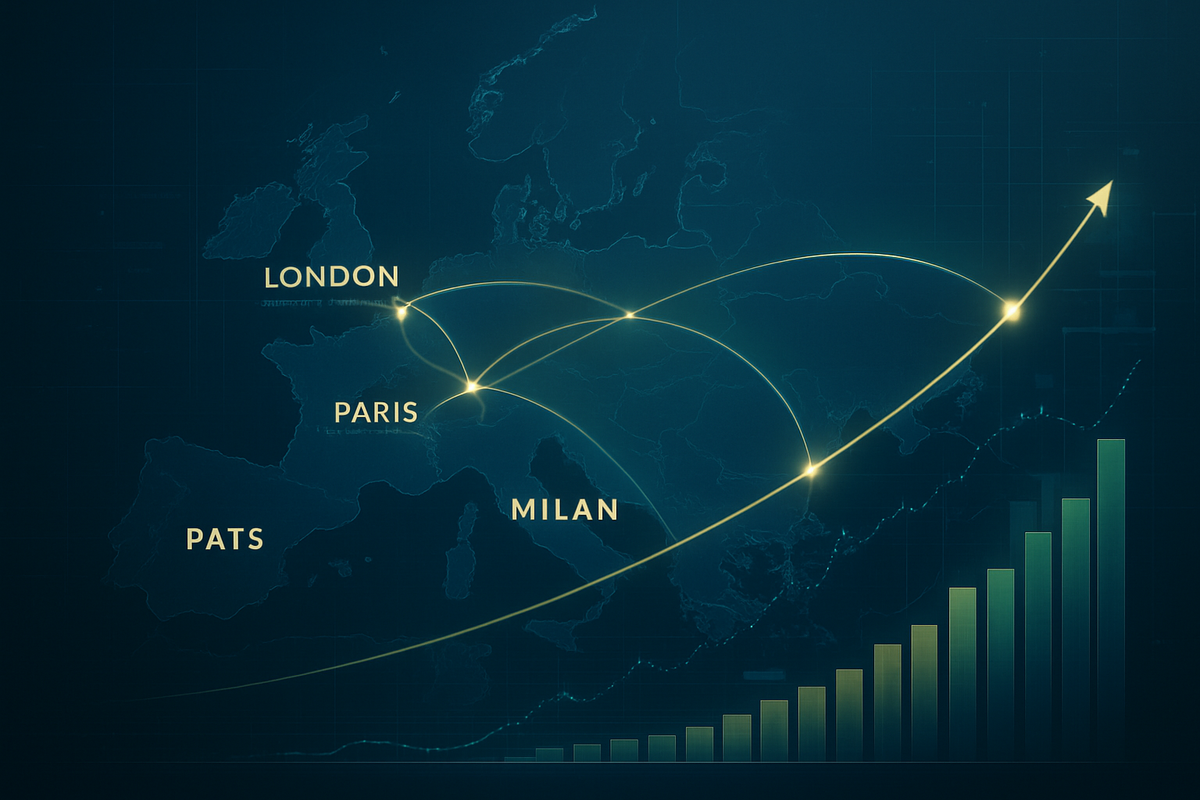
London, UK – November 14, 2025 – European capital markets are currently experiencing a robust period of expansion and strategic investment, marking a significant shift in the region's financial landscape. Firms across various sectors are aggressively strengthening their presence and ambitions, driven by improving macroeconomic conditions, a renewed pursuit of scale, and supportive policy initiatives. This dynamic environment is leading to a palpable increase in market activity, particularly in mergers and acquisitions (M&A), and is reshaping competitive dynamics across the continent.
The immediate implications of this trend are profound, fostering a more integrated and efficient financial system. European equities have shown a remarkable outperformance against their U.S. counterparts through much of 2025, buoyed by strong economic data, a strengthening Euro, and a more dovish stance from the European Central Bank (ECB). This surge in confidence and capital flow is not merely a fleeting moment but indicative of a deeper strategic repositioning as European companies vie for global competitiveness and resilience.
Unpacking the Surge: A Detailed Look at Strategic Moves
The current wave of strategic investments and expansions in European capital markets is multifaceted, touching upon banking, wealth management, technology, and industrial sectors. The timeline leading up to this moment has been characterized by a gradual easing of inflationary pressures and interest rates through 2024 and into 2025, creating a more fertile ground for deal-making and long-term capital deployment.
In the banking sector, consolidation efforts have been particularly pronounced. Since the start of 2025, M&A deals have totaled a record $27 billion, nearly doubling the volume from the same period in 2024. Key players are actively seeking to expand their reach and achieve greater efficiency through scale. For instance, UniCredit (BIT: UCG) has publicly expressed interest in acquiring rivals such as Commerzbank (ETR: CBK) and Banco BPM (BIT: BAMI). Similarly, BBVA (BME: BBVA) has launched a takeover bid for Banco Sabadell (BME: SAB), signaling a clear intent for domestic consolidation. Beyond the major players, regional consolidation is also evident, with Nationwide (private) successfully taking over Virgin Money (LSE: VMUK) in the UK, one of over 50 sizeable transactions in the past year.
The wealth and asset management sector remains a hotbed for growth and strategic acquisitions. Banco Santander (BME: SAN) acquired 89.9% of Tresmares Capital (private) in March 2025, while Banca Etica (private) took a 70% stake in Impact Sgr (private) in January 2025. Noteworthy also was BNP Paribas' (EPA: BNP) acquisition of Axa's asset management business (EPA: CS) in December 2024, demonstrating the continuous drive to expand capabilities and client bases in this lucrative area. Further bolstering Europe's technological backbone, FMC (private), a semiconductor pioneer, secured €100 million in November 2025 to commercialize energy-efficient memory chips for AI data centers. The EIB Group (private) is also significantly supporting technological innovation in Poland, allocating PLN 500 million to the new Future Tech Poland fund (private) and providing €25 million in venture debt to Synerise (private), an AI and automation firm, for R&D and international expansion. Even in traditional industries, Wienerberger (VIE: WIE), a building materials company, strengthened its European presence through acquisitions like MFP (private) in Ireland and the UK and increasing its stake in GSE Integration (GSEi) (private) in France in the first nine months of 2025.
Winners and Losers in a Reshaping Market
The ongoing trend of expansion and strategic investments is creating clear winners and presenting significant challenges for others in the European capital markets. Companies with strong balance sheets, clear strategic vision, and the agility to execute M&A deals are emerging as frontrunners. Large financial institutions like UniCredit (BIT: UCG), BBVA (BME: BBVA), Banco Santander (BME: SAN), and BNP Paribas (EPA: BNP) are poised to gain substantial market share, achieve greater operational efficiencies through economies of scale, and diversify their service offerings. Their acquisitions in banking and wealth management allow them to consolidate fragmented markets, reduce per-unit costs, and enhance their competitive positioning against global rivals.
Technology and innovation-focused firms also stand to benefit immensely. Companies like FMC (private) and Synerise (private), which are at the forefront of AI and energy-efficient computing, are attracting significant investment, enabling them to accelerate product development and global expansion. The EIB Group's (private) commitment to funding such ventures underscores a broader recognition of technology as a critical driver for Europe's future economic resilience. Furthermore, companies like Wienerberger (VIE: WIE), which are strategically acquiring complementary businesses, are strengthening their value chains and expanding their geographic footprint, making them more resilient and competitive in their respective sectors.
Conversely, smaller, less capitalized, or technologically stagnant firms face the risk of being marginalized or acquired at potentially lower valuations. The drive for scale in sectors like banking, where regulatory compliance and technology investments entail material fixed costs, puts pressure on smaller entities to either merge or find niche markets. Companies that fail to adapt to digital transformation or integrate sustainable practices may also find themselves at a disadvantage as investor preferences shift towards more future-proof businesses. The increased competition from consolidated entities could erode profit margins for those unable to achieve similar efficiencies or offer specialized services.
Wider Significance: A New Chapter for European Finance
This wave of expansion and strategic investment is more than just a series of isolated deals; it represents a pivotal moment in the broader evolution of European capital markets. It aligns perfectly with the European Union's ambitious goals to deepen its capital markets through initiatives like the Capital Markets Union (CMU) and the Savings and Investments Union (SIU). These policy frameworks aim to remove fragmentation, promote cross-border scale, and channel Europe's vast household savings into productive investments, fostering a more robust and integrated financial system capable of competing with global powerhouses. Legislative proposals expected by late 2025 to consolidate trading and post-trading infrastructures further underscore this commitment.
The trend also highlights Europe's strategic focus on building resilience and autonomy in key sectors. Investments in AI, green technology, digital infrastructure, and defense are not merely commercial decisions but are seen as crucial for Europe's long-term economic independence and security. The elevated levels of "dry powder" among private equity firms are also playing a significant role, providing substantial capital for these strategic shifts and driving a robust pipeline of divestments and new investments. Historically, periods of economic recovery and regulatory harmonization have often spurred similar waves of consolidation and investment, albeit perhaps not with the current emphasis on digital and green transitions. This current phase, however, is unique in its deliberate policy-driven support for integration and strategic autonomy, setting it apart from previous cycles.
The ripple effects extend beyond direct participants. Increased M&A activity typically leads to a more active advisory market for investment banks and legal firms. It also puts pressure on competitors to innovate, seek their own strategic partnerships, or risk falling behind. Regulatory bodies will also face the challenge of ensuring fair competition and financial stability amidst rapid consolidation, particularly in sensitive sectors like banking. Geopolitical tensions and trade disputes, while still present, appear to be less of a deterrent to intra-European strategic moves, with firms seemingly more focused on internal market strengthening.
What Comes Next: Navigating Opportunities and Challenges
Looking ahead, the European capital markets are poised for continued dynamism, with several short-term and long-term possibilities emerging from the current trend of expansion and strategic investments. In the short term, the robust M&A deal flow is expected to persist, particularly within the banking and financial services sectors, as firms continue to pursue scale and strategic capabilities. We can anticipate further announcements of significant mergers and acquisitions, driven by the ongoing pursuit of efficiency and market dominance. The focus will likely remain on integrating acquired assets efficiently and realizing anticipated synergies.
In the long term, the strategic pivots initiated now will shape the competitive landscape of European finance for decades. The emphasis on technology, particularly AI and digital solutions, will drive continuous innovation and investment, potentially leading to the emergence of new market leaders and business models. Policy-driven investments, fueled by initiatives like the SIU, are expected to unlock significant untapped potential in household wealth, channeling it into long-term projects and fostering a deeper, more diverse investor base. This could lead to a more resilient and self-sufficient European economy, less reliant on external capital flows.
However, challenges remain. Firms will need to navigate lingering economic uncertainty, potential geopolitical headwinds (such as US tariff actions or broader trade disputes), and the complexities of integrating diverse corporate cultures across borders. Market opportunities will emerge for those capable of providing specialized services in high-growth areas like sustainable finance, cybersecurity, and advanced data analytics. Conversely, companies failing to adapt to these evolving demands or those burdened by legacy systems and high operational costs may face increased pressure. Potential scenarios range from continued steady growth and integration, leading to a more unified and robust European market, to periods of volatility if external shocks or unforeseen regulatory hurdles emerge.
A Comprehensive Wrap-Up: Europe's Strategic Ascent
The current trend of expansion and strategic investments in European capital markets underscores a significant and deliberate shift towards greater integration, efficiency, and global competitiveness. Key takeaways include the robust rebound in M&A activity, particularly in banking and wealth management, driven by improved macroeconomic conditions and a strategic pursuit of scale. The proactive role of EU initiatives like the Capital Markets Union and Savings and Investments Union is critical in fostering this environment, providing a policy backbone for market deepening and cross-border collaboration.
Moving forward, the European market is set to become more consolidated and technologically advanced, with a clear focus on sectors vital for long-term economic resilience and strategic autonomy. Investors should watch for continued M&A announcements, particularly those involving major financial institutions and high-growth technology firms. The performance of European equities, which have largely outperformed their US counterparts in 2025, will be a key indicator of market confidence and the success of these strategic maneuvers. Furthermore, the implementation of legislative proposals related to trading and post-trading infrastructures will be crucial to monitor for their impact on market efficiency and liquidity.
Ultimately, this period of intense strategic activity is not just about individual deals but about a fundamental reshaping of Europe's financial architecture. It signifies a collective ambition to build a more integrated, robust, and competitive capital market capable of effectively channeling capital into the continent's future growth. The lasting impact will be a more resilient and dynamic European economy, better equipped to face global challenges and seize new opportunities.
This content is intended for informational purposes only and is not financial advice




